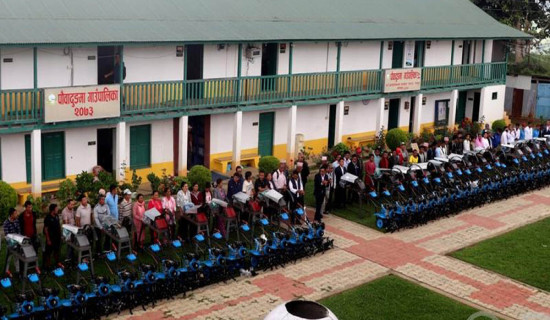- Wednesday, 2 July 2025
For Peace And Harmony
Despite all efforts for peace and stability, the world continues to be buffeted by conflicts, terrorism and wars. Russia and Ukraine are still engaged in the ruthless military confrontation. Very recently, India and Pakistan have become ready for a truce after a brief military skirmishes. Investment in military industry and buildup, justified under the guise of security, poses a threat to global peace and fraternity. Against this backdrop, Gautam Buddha's teachings of peace, non-violence, and compassion, taught over two millennia ago, are more relevant than ever. The message of Buddha offers a sacred path toward harmony for each individual and nation. The celebration of Buddha Jayanti, in his birthplace of Lumbini the other day, reminds us of the urgent need for making collective efforts to restore enduring peace and channel the nations' energy for the shared prosperity and happiness.
The teachings of the Buddha are not merely confined to prayers and religious rituals in the monasteries. They inspire the people walk on noble path and to be mindfulness for welfare of the community. The Buddhist values should be internalised in the day-to-day life, development and policy discourse and international relations. It is imperative for the powerful countries to invest in peacebuilding institutions, education, and spiritual growth rather than in armed and nuclear race. Prime Minister KP Sharma Oli has rightly pointed out the continued and lasting importance of the teachings of Buddha for the entire humanity. His observation highlights the enduring applicability of these teachings to the pursuit of peace, the cultivation of compassion, and the fostering of a shared sense of humanity among all people.
Buddha's timeless wisdom remains remarkably pertinent in addressing contemporary challenges facing the world. The potential of developing Lumbini as a global spiritual centre is huge for Nepal and the whole world. However, the limited infrastructure cannot achieve this vision. At the heart of Lumbini, inquiry, dialogue, and intellectual vision based on the wisdom of the Buddha, must be taken wider and farther. A Buddhist university that is committed to promoting Buddha's teachings should be evolved into an international academic centre for enhancing ethical values, intercultural debate and peace innovation.
For Nepal, Buddhism also serves as soft power to boost its image in the global forums. It entails to rebalance humanity's moral compass. The present world situation, in which truth can be easily muffled by political expediency and empathy crushed into aggression, requires a revolutionary change in our understanding of peace, harmony and co-existence. The shared histories and values of Buddha should be included in goodwill and cooperation, especially among culturally intertwined nations. Peacebuilding is a diplomatic nicety which in essence involves building mutual trust, civic values, and educational exchange not constrained by borders.
It is paramount to achieve lasting and unwavering peace. It requires sustained and determined efforts, a commitment to resolute and proactive peacebuilding. This needs a multifaceted approach, encompassing active participation in developing effective peace-oriented policies, initiatives that promote understanding and mutual cooperation, and collective commitment to peaceful resolutions of issues. The nations should foster a shared sense of responsibility for building and maintaining peace within the communities and worldwide, guided by the philosophy of the Buddha.

















